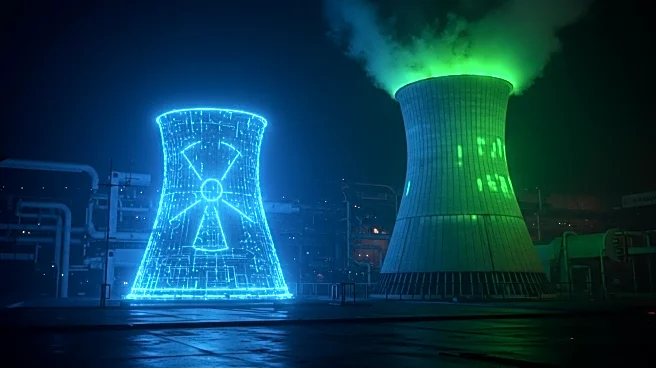What's Happening?
The Asia Pacific region is leading the global growth in nuclear energy as countries seek to balance the need for decarbonization with reliable power generation. China and India are at the forefront of reactor construction to meet increasing electricity demand and climate goals. Japan is also restarting reactors under strict safety regulations. The push for clean energy is a major driver, with nuclear power providing the necessary baseload to complement intermittent renewable sources like solar and wind. Energy security concerns, fueled by geopolitical tensions and fossil fuel price volatility, are prompting countries to diversify their energy mix, with nuclear energy emerging as a strategic solution. Advancements in reactor design, supported by government investments, are paving the way for new technologies such as small modular reactors and Generation IV reactors, which offer enhanced safety and efficiency.
Why It's Important?
The expansion of nuclear energy in the Asia Pacific region has significant implications for global energy security and climate change mitigation. As countries invest in nuclear technology, they are better positioned to reduce reliance on fossil fuels, thereby decreasing carbon emissions and contributing to climate stability. The development of advanced reactors also promises to enhance safety and reduce radioactive waste, addressing some of the longstanding concerns associated with nuclear power. This shift could influence energy policies worldwide, encouraging other regions to consider nuclear energy as a viable option for sustainable power generation. The projected growth of the nuclear energy market to $341.15 billion by 2032 underscores its potential impact on the global energy landscape.
What's Next?
With ongoing innovation and strong policy backing, nuclear power is set to play a critical role in ensuring energy security and climate stability for decades. Countries in the Asia Pacific region are likely to continue investing in nuclear technology, potentially leading to increased collaboration and sharing of best practices. The development of small modular reactors and Generation IV reactors could expand nuclear energy's applicability to remote areas and industrial applications, further diversifying the energy mix. As geopolitical tensions persist, the strategic importance of nuclear energy in national security and economic stability is expected to grow.
Beyond the Headlines
The shift towards nuclear energy in the Asia Pacific region may have broader implications for international relations and energy diplomacy. As countries become more self-sufficient in energy production, they may reduce their dependence on imported fossil fuels, potentially altering trade dynamics and geopolitical alliances. The emphasis on nuclear energy also raises ethical and environmental considerations, particularly regarding waste management and the long-term sustainability of nuclear technology. These factors will likely influence public policy and regulatory frameworks as nations navigate the complexities of nuclear energy adoption.










